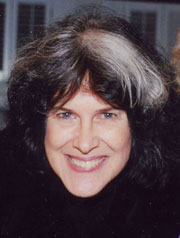 |
→ March 2006 Contents → E-bits
|
E-Bits:
A Wild Ride to We-Can-Too March 2006 |
 |
||||||
|
Nineteenth-century author Henry David Thoreau said, "If you have built castles in the air, your work need not be lost; that is where they should be. Now put the foundations under them." There's no argument that we all appreciate a forward-looking and enlightened vision of the future, and generally there's no beef with the idea of creating something orderly out of that which is chaotic. Transformation to a greater good is the highest aspiration for any project of renovation or reform. Our experience of reality is wholly different than in previous times, and we have started to live in an era when nothing is static, change is the norm, and where transformation one way or another is a constant—and it's a wild ride. Because of mass communication, we're aware of what is happening in the world beyond our immediate surroundings, so everyone everywhere is taking on an extra load of not only the known facts of local existence, but also things that happen elsewhere, things that were previously unavailable to be known in an immediate sense. Hence, we encounter new stressors as we strive to cope with more than our share, and it is not an easy task. Staying in our seats on the roller coaster of everyday life takes not only skill and competence, but also a great deal of knowledge and imagination even to stay in the general area of the theme park, so to speak. Take a look at this video metaphor of the rides we are taking on "The Screaming Eagle," "The Freeze," and "The Boss," so aptly named, I might add, at Six Flags in St. Louis.
To add depth to our comprehension of today's challenges, I quote one of our most revered and imaginative leaders from a February 2002 Department of Defense news briefing:
"As we know, there are known knowns. There are things we know that we know. There are known unknowns, that is to say, there are things that we now know we don't know. But there are also unknown unknowns, there are things we do not know we don't know."
What a mouthful. Pretty confusing when Secretary Rumsfeld first said it, but it did cover the subject of "knowns" and "unknowns," didn't it? Facts, coupled with a sweeping vision, are sure to bring us to a better future — but these days many are asking, "What facts?" and "What future?" No doubt, like me, you are looking forward with great anticipation to the forthcoming foundations under these castles in the air, but in the meantime I think it wise to adapt to a protracted free-floating situation. Houses of cards or castles in the air — you decide your own vision of the future. As the suspense keeps building and we wait for something solid to manifest, contemplate these things.
For a positive future to come about, according to the Dalai Lama, it will take all our eyes fixed on the greater good, coupled with an enlightened but realistic vision, the willingness to be generous and humanitarian in spirit, and a constructive attitude — things which fortunately are endemic to the higher aspects of human nature the world over. This sort of behavioral effort is self-perpetuating once it is firmly rooted, and it is clear from today's state of affairs, not to mention the affairs of state, that we are going to have to shift to a new and better paradigm than the one that got us to this point. That sentiment is borrowed from Einstein, many of whose ideas are floating around cyberspace these days, who observed, "The problems that exist in the world today cannot be solved by the level of thinking that created them." He also said, "The further the spiritual evolution of mankind advances, the more certain it seems to me that the path to genuine religiosity does not lie through the fear of life, and the fear of death, and blind faith, but through striving after rational knowledge." I like that sort of can-do attitude, and forgive me for making the pun, as you contemplate this gallery of photos of the kinds of things people can do with cans. For more about these fascinating designs and others, see Canstruction.org.
Along with the beginning of spring in the Northern Hemisphere and fall in the Southern, let's hope March brings new ways of thinking about the future, and most of all, the idea of hope.
© Beverly Spicer
The links that appear in this column are from the World Wide Web. Credit is given where the creator is known. The Digital Journalist and the author claim no copyright ownership of any video or photographic materials that appear herein. |
|||||||
Back to March 2006 Contents
|
|





